| Listing 1 - 10 of 42 | << page >> |
Sort by
|
Multi
ISBN: 9781107610316 9781107035201 1107035201 9781139547369 1107610311 1139990160 113998554X 1139547364 Year: 2014 Publisher: New York, N.Y. Cambridge University Press
Abstract | Keywords | Export | Availability | Bookmark
 Loading...
Loading...Choose an application
- Reference Manager
- EndNote
- RefWorks (Direct export to RefWorks)
In recent years, multimedia learning, or learning from words and images, has developed into a coherent discipline with a significant research base. The Cambridge Handbook of Multimedia Learning is unique in offering a comprehensive, up-to-date analysis of research and theory in the field, with a focus on computer-based learning. Since the first edition appeared in 2005, it has shaped the field and become the primary reference work for multimedia learning. Multimedia environments, including online presentations, e-courses, interactive lessons, simulation games, slideshows, and even textbooks, play a crucial role in education. This revised second edition incorporates the latest developments in multimedia learning and contains new chapters on topics such as drawing, video, feedback, working memory, learner control, and intelligent tutoring systems. It examines research-based principles to determine the most effective methods of multimedia instruction and considers research findings in the context of cognitive theory to explain how these methods work.
Cognitive psychology --- Computer assisted instruction --- Road traffic --- Computer-assisted instruction --- Interactive multimedia --- Computer-assisted instruction. --- Interactive multimedia. --- Interactieve multimedia --- Multimedia --- Hypermedia systems --- Interactive media --- Computer software --- CAI (Computer-assisted instruction) --- Computer-aided instruction --- Computer-assisted learning --- Computer based instruction --- Computer-enhanced learning --- Electronic data processing in programmed instruction --- ILSs (Integrated learning systems) --- Integrated learning systems --- Microcomputer-aided instruction --- Microcomputer-assisted instruction --- Microcomputer-assisted learning --- Microcomputer-based instruction --- Teaching --- Education --- Educational technology --- Programmed instruction --- Telematics --- Data processing --- Educational psychology
Book
ISBN: 9780521514125 9780521735353 9780511811678 9780511506468 0511506465 9780511504327 0511504322 9781139129879 1139129872 0511811675 0521514126 0521735351 0511737696 1107190088 1283330407 9786613330406 1139134914 1139133802 Year: 2012 Publisher: Cambridge Cambridge University Press
Abstract | Keywords | Export | Availability | Bookmark
 Loading...
Loading...Choose an application
- Reference Manager
- EndNote
- RefWorks (Direct export to RefWorks)
Although verbal learning offers a powerful tool, Mayer explores ways of going beyond the purely verbal. Recent advances in graphics technology and information technology have prompted new efforts to understand the potential of multimedia learning as a means of promoting human understanding. In this second edition, Mayer includes double the number of experimental comparisons, 6 new principles - signalling, segmenting, pertaining, personalization, voice and image principles. The 12 principles of multimedia instructional design have been reorganized into three sections - reducing extraneous processing, managing essential processing and fostering generative processing. Finally an indication of the maturity of the field is that the second edition highlights boundary conditions for each principle research-based constraints on when a principle is likely or not likely to apply. The boundary conditions are interpreted in terms of the cognitive theory of multimedia learning, and help to enrich theories of multimedia learning.
Audiovisual methods --- Didactics --- audiovisuele opvoeding --- Computer architecture. Operating systems --- Computer-assisted instruction. --- Interactive multimedia. --- Hypermedia systems --- Interactive media --- Computer software --- CAI (Computer-assisted instruction) --- Computer-aided instruction --- Computer-assisted learning --- Computer based instruction --- Computer-enhanced learning --- Electronic data processing in programmed instruction --- ILSs (Integrated learning systems) --- Integrated learning systems --- Microcomputer-aided instruction --- Microcomputer-assisted instruction --- Microcomputer-assisted learning --- Microcomputer-based instruction --- Teaching --- Education --- Educational technology --- Programmed instruction --- Telematics --- Data processing --- Computer-assisted instruction --- Interactive multimedia --- Health Sciences --- Psychiatry & Psychology
Book
ISBN: 0716712768 071671275X Year: 1981 Publisher: San Francisco, Calif.
Abstract | Keywords | Export | Availability | Bookmark
 Loading...
Loading...Choose an application
- Reference Manager
- EndNote
- RefWorks (Direct export to RefWorks)
Cognitive psychology --- Cognition --- 159.95 --- 159.95*1 --- Psychology, Cognitive --- Cognitive science --- Psychology --- Geestelijke functies --- Cognitieve psychologie --- 159.95*1 Cognitieve psychologie --- 159.95 Geestelijke functies
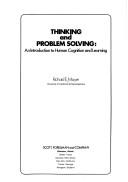
ISBN: 0673150550 9780673150554 Year: 1977 Publisher: Glenview, Ill. Scott, Foresman
Abstract | Keywords | Export | Availability | Bookmark
 Loading...
Loading...Choose an application
- Reference Manager
- EndNote
- RefWorks (Direct export to RefWorks)
Cognitive psychology --- Problem Solving --- Thinking --- Thought and thinking --- Problem solving --- Pensée --- Résolution de problème --- 159.95*1 --- 681.3*I28 --- 681.3*J4 --- Mind --- Thoughts --- Educational psychology --- Philosophy --- Psychology --- Intellect --- Logic --- Perception --- Psycholinguistics --- Self --- Methodology --- Decision making --- Executive functions (Neuropsychology) --- Cognitieve psychologie --- Problem solving, control methods and search: backtracking; dynamic program- ming; graph and tree search strategies; heuristics; plan execution, formationand generation (Artificial intelligence)--See also {681.3*F22} --- Social and behavioral sciences (Computer applications) --- Problem solving. --- Thought and thinking. --- 681.3*J4 Social and behavioral sciences (Computer applications) --- 681.3*I28 Problem solving, control methods and search: backtracking; dynamic program- ming; graph and tree search strategies; heuristics; plan execution, formationand generation (Artificial intelligence)--See also {681.3*F22} --- 159.95*1 Cognitieve psychologie --- Pensée --- Résolution de problème --- Thinking. --- Problem Solving.
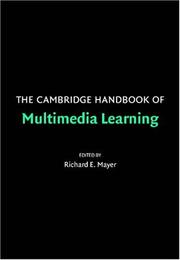
ISBN: 0521547512 0521838738 0511816812 Year: 2005 Publisher: Cambridge : Cambridge University Press,
Abstract | Keywords | Export | Availability | Bookmark
 Loading...
Loading...Choose an application
- Reference Manager
- EndNote
- RefWorks (Direct export to RefWorks)
In the last decade, the field of multimedia learning emerged as a coherent discipline with an accumulated research base that had never been synthesized and organized in a handbook. The Cambridge Handbook of Multimedia Learning, first published in 2005, constituted the world's first handbook devoted to comprehensive coverage of research and theory in the field of multimedia learning. Multimedia learning is defined as learning from words (e.g., spoken or printed text) and pictures (e.g. illustrations, photos, maps, graphs, animation, or video). The focus of this handbook is on how people learn from words and pictures in computer-based environments. Multimedia environments include online instructional presentations, interactive lessons, e-courses, simulation games, virtual reality, and computer-supported in-class presentations. The Cambridge Handbook of Multimedia Learning seeks to establish what works (that is, to ground research in cognitive theory), and to consider when and where it works (that is, to explore the implications of research for practice).
371.694 --- #PBIB:2005.4 --- Geprogrammeerde instructie. CAI. Leermachines. Computerbegeleid onderwijs. --- 371.694 Geprogrammeerde instructie. CAI. Leermachines. Computerbegeleid onderwijs. --- Audio-visual education --- Computer-assisted instruction --- Interactive multimedia --- Educational technology --- Teaching --- Instructional materials personnel --- Visual education --- Hypermedia systems --- Interactive media --- Computer software --- Geprogrammeerde instructie. CAI. Leermachines. Computerbegeleid onderwijs --- Handbooks, manuals, etc. --- Health Sciences --- Psychiatry & Psychology
Book
ISBN: 0716714418 9780716714415 Year: 1983 Publisher: New York (N.Y.): Freeman
Abstract | Keywords | Export | Availability | Bookmark
 Loading...
Loading...Choose an application
- Reference Manager
- EndNote
- RefWorks (Direct export to RefWorks)
Thought and thinking --- Problem Solving --- Cognition --- 159.95*1 --- Cognitieve psychologie --- 159.95*1 Cognitieve psychologie --- Problem solving --- Mind --- Thinking --- Thoughts --- Educational psychology --- Philosophy --- Psychology --- Intellect --- Logic --- Perception --- Psycholinguistics --- Self --- Methodology --- Decision making --- Executive functions (Neuropsychology)
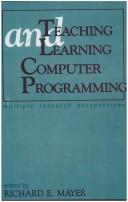
ISBN: 0805800735 9780805800739 Year: 1988 Publisher: Hillsdale Erlbaum
Abstract | Keywords | Export | Availability | Bookmark
 Loading...
Loading...Choose an application
- Reference Manager
- EndNote
- RefWorks (Direct export to RefWorks)
Computer programming --- Study and teaching --- -Computers --- Electronic computer programming --- Electronic data processing --- Electronic digital computers --- Programming (Electronic computers) --- Coding theory --- Programming --- -Study and teaching --- Computer programming - Study and teaching
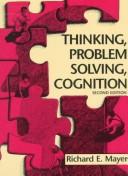
ISBN: 0716722143 0716722151 0716722151 Year: 1992 Publisher: New York : W.H. Freeman,
Abstract | Keywords | Export | Availability | Bookmark
 Loading...
Loading...Choose an application
- Reference Manager
- EndNote
- RefWorks (Direct export to RefWorks)
Thought and thinking. --- Problem solving. --- Cognition. --- 159.956 --- 167.7 --- Rationeel denken. Gezond verstand --- Wetenschappelijke theorie. Theorie en praktijk. Theorievorming. Model --- 167.7 Wetenschappelijke theorie. Theorie en praktijk. Theorievorming. Model --- 159.956 Rationeel denken. Gezond verstand --- Cognition --- Problem solving --- Thought and thinking --- Mind --- Thinking --- Thoughts --- Educational psychology --- Philosophy --- Psychology --- Intellect --- Logic --- Perception --- Psycholinguistics --- Self --- Methodology --- Decision making --- Executive functions (Neuropsychology) --- Heuristic. --- Heuristique. --- Résolution de problème --- Heuristique --- Résolution de problème --- Processus cognitifs
Book
ISBN: 0673391876 0316551511 9780316551519 9780673391872 Year: 1987 Publisher: Boston Little, Brown
Abstract | Keywords | Export | Availability | Bookmark
 Loading...
Loading...Choose an application
- Reference Manager
- EndNote
- RefWorks (Direct export to RefWorks)
Pedagogiek en onderwijskunde --- psychologische pedagogiek --- psychologische pedagogiek. --- Educational psychology --- Education --- Psychology
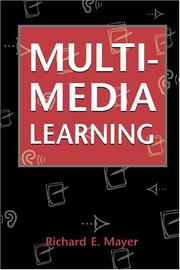
ISBN: 0521787491 0521782392 1139164600 9780521787499 9780521782395 Year: 2001 Publisher: Cambridge : Cambridge University Press,
Abstract | Keywords | Export | Availability | Bookmark
 Loading...
Loading...Choose an application
- Reference Manager
- EndNote
- RefWorks (Direct export to RefWorks)
800.515 --- 084 --- 084 Grafische voorstellingen. Illustraties. Audio-visuele documentatie. Multimedia --- Grafische voorstellingen. Illustraties. Audio-visuele documentatie. Multimedia --- 800.515 Computerondersteunend (taal)onderwijs. Computer Assisted Language Learning --- Computerondersteunend (taal)onderwijs. Computer Assisted Language Learning --- Computer-assisted instruction --- Interactive multimedia --- Hypermedia systems --- Interactive media --- Computer software --- CAI (Computer-assisted instruction) --- Computer-aided instruction --- Computer-assisted learning --- Computer based instruction --- Computer-enhanced learning --- Electronic data processing in programmed instruction --- ILSs (Integrated learning systems) --- Integrated learning systems --- Microcomputer-aided instruction --- Microcomputer-assisted instruction --- Microcomputer-assisted learning --- Microcomputer-based instruction --- Teaching --- Education --- Educational technology --- Programmed instruction --- Telematics --- Data processing --- Computer-assisted instruction. --- Interactive multimedia. --- #BAVD --- #PBIB:2001.4 --- #SBIB:309H501 --- #SBIB:316.334.1O400 --- Mediapedagogiek (incl. mediadidactiek) --- Leer- en onderwijsgedrag: algemeen --- Health Sciences --- Psychiatry & Psychology --- Enseignement multimedia
| Listing 1 - 10 of 42 | << page >> |
Sort by
|

 Search
Search Feedback
Feedback About UniCat
About UniCat  Help
Help News
News